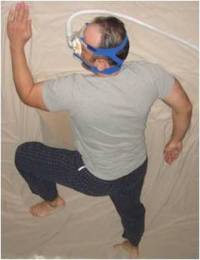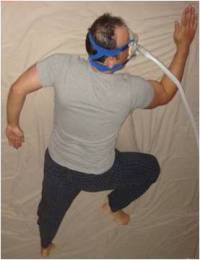Now to start looking at the insomnia issues since fixing your sleep is going to require fixing the insomnia as well as the OSA. So that means learning to
sleep well with the alien on your face.
You describe your insomnia/sleep as follows:
dacotto1984 wrote: ↑Wed Sep 21, 2022 7:39 pm
These days, i would go to bed maybe like at 11pm and sleep by 12am. Then i wake up at 5:30am, urinate & then stay up til 7am sleep til 830am. Sometimes i wont sleep after waking up to urinate. Ill just stay there struggling to sleep. Which to me is not normal at all. Before my CPAP/jolting-waking up attacks, i would sleep at midnight, wake up 3 times to urinate, get back to sleep within 15 minutes and wake up like at 930am. No issues. (of course i would still feel very tired at certain parts of my day such as when driving and at job meetings).
So before you started PAPing you would get to sleep at midnight---did you go to bed at 11pm and take an hour to get to sleep back then? Or did you go to bed close to midnight and fall asleep pretty quickly?
And now, you definitely take an hour to get to sleep. What's going through your mind when you are lying in bed trying to get to sleep with the CPAP mask on your face? And how comfortable are you physically with the mask on your face and air being blown up your nose and down your throat? In other words, are you physically comfortable, but your mind is racing with worry about
non-CPAP things? Or are you physically uncomfortable and your mind is focused on just how uncomfortable you are with the alien blowing air up your nose?
Next: Pre-CPAP, you would wake up 3 times between midnight and 9:30 needing to pee. So that means you probably were waking up to go pee every 2 1/2 hours or so. (In other words, I'm guessing you probably woke up around 2:30, 5:00, and 7:30 each night needing to go pee.) But you were able to get back to sleep in about 15 minutes each time. Still--that's a total of 45 minutes of lying in bed not sleeping because you needed to go pee.
Now? You're making it all the way to 5:30 before you wake up needing to go pee.
That is a small but significant improvement. By your own description, your
longest stretch of uninterrupted sleep has gone from roughly 2 1/2 hours to 5 1/2 hours. It's quite likely that the reason you are
not waking up at 2:30 am needing to pee, the way you used to, is that your very severe
untreated OSA was causing you to wake up needing to pee every 2 hours. (That's actually a pretty commonly reported symptom of
untreated OSA around here.). With PAP, your body has already learned it can go 5 1/2 hours without needing to wake you up to go pee. And in time, you might find yourself not waking up needing to go pee at all during the night. At least until you're old enough to have what my 64-year old husband calls "little old man bladder" problems caused by an enlarged prostrate.
Next: Pre-Cpap, you got up at probably 2:30, 5:00, and 7:30 to go pee every night. It took you about 15 minutes to get back to sleep after each trip to the bathroom. And then you went back to bed and finally got up around 9:30. So between midnight and 9:30, you were getting around 8.75 hours of sleep that was severely disturbed by your untreated apnea with an AHI = 90+. And you woke up "ok", but you would be
tired when you drove or had meetings. In other words, your sleep was not really refreshing---you didn't wake up feeling great, but you also didn't wake up feeling awful. Now here's the thing: While your sleep was badly disrupted by the OSA, which prevented your body from getting its full rest, your
mind was not racing all night long
worrying about everything from your OSA to keeping your job to the latest run-in with your wife over visiting your mother to your child to your finances to how much more time there is before you have to get up to how sick you are of not being able to sleep. In other words, when you were in bed, you weren't lying there
worrying and getting more and more anxious. And that's probably why you were able to wake up feeling OK, but not great and why you had enough energy to get through the day without feeling like you were in a brain fog all day long.
Except for the fact that I didn't need to wake up to go pee every night, your pre-CPAP sleep pattern sounds rather like mine was: It took me about 45-60 minutes to get to sleep, but I used the time to daydream rather than worry. And I usually didn't remember any significant wakes until the alarm went off and I had to get up (around 7:00 AM). And except for hand & foot pain, I felt OK, but not great when I woke up. And I never had any significant problems with daytime sleepiness, but I would get tired at certain times of the day.
Now that you're using the CPAP, you're sleeping all the way to 5:30 AM without a bathroom break. (Yea!), but once you wake up at 5:30, you can't really seem to get back to sleep until 7:00 AM. You seem to say that sometimes you "just stay up" and sometimes you go back to bed and simply can't get back to sleep. So the
new problem is that period between 5:30 and 7:00: Your body does not want to be asleep, but your mind says you
should be asleep. And so you sit or lay there and fret over the fact that the minutes are ticking away and you are
not sleeping. And that in turn triggers the more general
worrying about anything and everything else your mind can think of. And all that
worrying makes it even
harder to get back to sleep. So you get more and more frustrated and more and more anxious about the fact that you are
not asleep. Does that sound like an accurate description of what's going on?
So let's try to figure out what might be going on at 5:30 after you finish peeing. Your body has just gotten 5.5 hours of blissfully peaceful sleep
without any apneas & hypopneas to speak of. And while pre-CPAP your mind thought you were getting 8.75 hours of sleep, with all the wakes and arousals from 90+ apneas & hypopneas per hour, you probably were waking up for 20-30 seconds at a time maybe 40-60 times per hour. In other words, during one hour of "sleep" with your untreated OSA, you probably were actually awake for a total of 15-30 minutes during that hour of sleep. What this means is that in 8.75 hours of untreated OSA "sleep", your body may very well have only managed to actually be asleep somewhere between 5 hours and and 6 hours.
In other words, the total amount of sleep your body is currently getting between midnight and 5:30AM may be pretty much equal to the total amount of real sleep (not SWJ and not wake) that you were getting in 8.75 hours of untreated OSA "sleep." So what may very well be going on at 5:30 AM is that your body is saying, "Hey we've got as much sleep as we're used to, so why go back to sleep?" and your mind is saying "Hey it's 5:30 in the f*cking morning and I don't want to be up yet. Why won't you let me go back to sleep?"
In this case, as crazy as it sounds, the best thing you can do is go ahead and get out of bed and
do something interesting and
fun. In other words, pay attention to your body: If it's not sleepy, don't force it to try to get to sleep. If you feel like you're getting sleepy at 6:30 or 7:00, then go back to bed and allow yourself the privilege of
enjoying the extra sleep.
Over time what should happen is that your body will recognize that getting more like 6.5 or 7 hours of sleep feels better than getting 5.5, and your sleep period may start to lengthen. It could happen by you starting to feel
sleepy earlier in the evening and hence you may start finding that you are ready to fall asleep earlier than midnight. Or it may happen by you starting to sleep until 6:00 instead of waking up at 5:30. Or it may happen at both ends.
But right now, you have to learn to
not fight with your body: If your body is not
sleepy then don't lie in bed fighting to get to sleep. Just get up and use the time to do something for yourself. And above all else,
don't worry about not being asleep just because it's 5:30 in the morning.
I want to remind you that you wrote this about your early morning (5:30 AM) wakes:
but yeah, i guess i also wake up during those times cause those are the only precious times i have to myself.. time to sit down and think and be at peace.
Run with that idea: Rather than
worrying about how much time you have left for sleep, enjoy getting up out of bed and doing something for yourself that helps you be at peace instead of feeding your general anxiety.
Joined as robysue on 9/18/10. Forgot my password & the email I used was on a machine that has long since died & gone to computer heaven.
Correct number of posts is 7250 as robysue + what I have as robysue1
Profile pic: Frozen Niagara Falls











